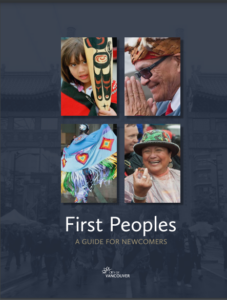We are very excited to have students joining us for the Indigenous Student Summer Program. While it is interesting to learn about the Indigenous history and culture through a first-person perspective, some students find it uncomfortable and overwhelming answering questions from their colleagues. Students can feel pressured to help educate others about these topics and it can get tiring answering the same questions over and over. This package aims to provide a background of the Indigenous history and culture for supervisors and anyone interested.
We recommend taking this excellent free course offered by BCIT. This course promotes an increased understanding of Indigenous people and their place and space in Canada, past and present. Words like Reconciliation and Indigenization are becoming commonplace and are often followed by questions such as, “What do these words mean? Why do we have to do this? How come I didn’t know about Residential Schools?”. The course will provide you with foundational knowledge of Indigenous people in the hopes that as the true history and contemporary reality of Indigenous people is more broadly known, Reconciliation can begin.
This is a self-paced course that can be completed in 2 to 3 hours. For help with registration, see below.
The BCIT Indigenous awareness course was designed based on First Peoples: A guide for newcomers
Indigenous people in Canada
There are three distinct groups of Indigenous people in Canada: First Nations, Inuit and Métis, as defined by Section 35 (2) of the Constitution Act, 1982. Vancouver is located on the unceded land of three Local First Nations: Squamish, Musqueam and Tsleil-Waututh while Kelowna is located on the unceded land of the Syilx Okanagan Nation.
Indigenous people had, and continue to experience, higher rates of poverty, substance abuse, homelessness, unemployment, malnutrition, and deaths among youth and children including suicide and murder of indigenous women, girls and 2-spirited peoples. In particular, Highway 16 between Prince George and Prince Rupert in British Columbia is known as the Highways of Tears due to the high number of murders and missing First Nations women and girls on the highway.
In addition, Indigenous people were put into residential schools by the Canadian government to assimilate them into the Euro-Canadian society. Indigenous children were forcibly removed from their villages and had to give up their languages, spiritual beliefs and cultural practices. As you will learn more in the resources provided, the consequences of residential schools not only impacted people that went through residential school but many generations after. Indigenous people that went through residential schools often developed post-traumatic stress disorder (PTSD) and the effects of traumatic experiences are often passed to the next generation, causing intergeneration trauma in children and grandchildren of residential school survivors.
UBC Indigenous Resources
xʷməθkʷəy̓əm: Land Beneath Our Feet
UBC is located on the traditional, ancestral, and unceded territory of the hən̓q̓əmin̓əm̓ speaking xʷməθkʷəy̓əm (Musqueam) people. This research guide, hosted by Xwi7xwa Library, provides resources and research strategies for deepening knowledge of this relationship and of Musqueam.
Indigenous Learning Pathways: Land Acknowledgements at UBC
This course is designed to support all UBC staff and faculty in learning more about how to meaningfully acknowledge Indigenous lands and peoples. The content invites learners who are familiar with the concept of land acknowledgements but may have never done one before, and is also useful to those who do them on a regular basis but would like to deepen their existing knowledge and understanding.
Indigenous Language Guide
The Indigenous Peoples Language Guide, which was created in partnership with the First Nations House of Learning at UBC provides useful information on how to navigate the terminology and meanings associated with Indigenous peoples in order to produce the best — and most respectful — communication results.
Timeline
Developed by the UBC Centre for Teaching and Learning Technology, this timeline documents UBC’s key historical moments with Indigenous peoples, while locating these moments in broader contexts at institutional, provincial, and national levels (i.e., UBC, BC, and Canada). Read more
Want to explore further?
We compiled a list of articles, books, podcasts, movies, and shows that you can explore to learn more about the Indian Act, residential schools, how Indigenous communities are healing and what the rest of the society is doing to reconcile.
Visit the additional resources page
Instructions for Registering for MOOC-0200 Indigenous Awareness course from BCIT:
- Follow the link: https://www.bcit.ca/courses/indigenous-awareness-mooc-0200/
- Click add to cart and view cart
- Confirm that you have read the information in the cart and click continue to registration. This course is free so you can ignore the popup message on payment being required at checkout.
If you are new to BCIT:
-
-
- Click Create a BCIT ID and follow the instructors on the webpage
- Log in with your ID and password to register
-
If you previously have a BCIT ID:
-
-
- Sign in with your current ID and password
- Follow the instructions and confirm your registration
-
- Once registered, log in to learn.bcit.ca with your BCIT email address and password to access your online course
(NOTE: it may take up to 24 hours for course access to become active) - You should see the course tab under my courses

